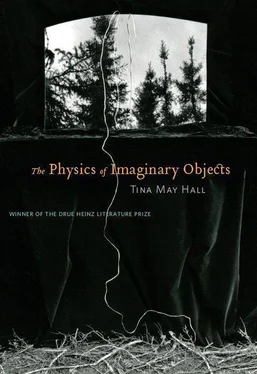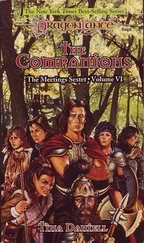Tina Hal - The Physics of Imaginary Objects
Здесь есть возможность читать онлайн «Tina Hal - The Physics of Imaginary Objects» весь текст электронной книги совершенно бесплатно (целиком полную версию без сокращений). В некоторых случаях можно слушать аудио, скачать через торрент в формате fb2 и присутствует краткое содержание. Год выпуска: 2010, Издательство: University of Pittsburgh Press, Жанр: Современная проза, на английском языке. Описание произведения, (предисловие) а так же отзывы посетителей доступны на портале библиотеки ЛибКат.
- Название:The Physics of Imaginary Objects
- Автор:
- Издательство:University of Pittsburgh Press
- Жанр:
- Год:2010
- ISBN:нет данных
- Рейтинг книги:5 / 5. Голосов: 1
-
Избранное:Добавить в избранное
- Отзывы:
-
Ваша оценка:
- 100
- 1
- 2
- 3
- 4
- 5
The Physics of Imaginary Objects: краткое содержание, описание и аннотация
Предлагаем к чтению аннотацию, описание, краткое содержание или предисловие (зависит от того, что написал сам автор книги «The Physics of Imaginary Objects»). Если вы не нашли необходимую информацию о книге — напишите в комментариях, мы постараемся отыскать её.
The Physics of Imaginary Objects,
The Physics of Imaginary Objects — читать онлайн бесплатно полную книгу (весь текст) целиком
Ниже представлен текст книги, разбитый по страницам. Система сохранения места последней прочитанной страницы, позволяет с удобством читать онлайн бесплатно книгу «The Physics of Imaginary Objects», без необходимости каждый раз заново искать на чём Вы остановились. Поставьте закладку, и сможете в любой момент перейти на страницу, на которой закончили чтение.
Интервал:
Закладка:
“What does it mean?”
“It's proof, of course.”
It isn't until she has accepted his offer of a ride back to her apartment that she realizes they haven't talked at all about his problem. He is quiet when she reminds him of it. The artificial voice box is a moth, still in his cupped palm. Then he says he was wondering if it was possible to bury objects, not a person, just an inanimate thing, in consecrated ground. She thinks for a long time before she has to say she doesn't know, but she doesn't think so. He sighs when she tells him this. The noise comes from his mouth, not the box; it is a painful sound that makes her knuckles ache. When they reach her apartment, he asks if he can come in for a moment, says that there's something he'd like to show her. And because she feels this bond with him, this recognition, she doesn't even question him, just nods and leads him down the sidewalk to her door.
“Do you have a tape player?”
His voice seems weaker, more metallic than before, and she wonders if he isn't used to talking so much. So, as if her not speaking could conserve his strength, she simply nods again and points to the corner of the living room. He stands in front of the machine for a while, both hands pressed against it. When he does move, it is to reach into his pocket, but this time he brings out a cassette tape, not the silver box. He places it in the deck and presses play, and for a few minutes the room is quiet except for the murmur of the tape cycling into the machine. Rosa is still standing in the entranceway, the door open behind her, and she can see the dark form of his car in the mirror on the opposite wall, and strangely, she can see another reflection within that image. She recognizes the blur of the moon on his windshield as a voice comes out of the speakers and she knows without him telling her, for he is not talking or even looking at her, that this is his voice, was his voice. It is a child singing a song about a spider and a rainstorm, and as the rain starts falling, there is a click where the recording stops.
“May I leave this with you?”
This surprises her but she knows she will say yes, knows she won't be able to help herself, and the sound of the tape player continuing past the voice, scanning silence, brings back that feeling of praying in the empty chapel and another memory, the rasp of metal against stone tile, the smell of onions, the whine a bone makes when it is lost. Rosa wants to give him something in exchange, to show him the thing she holds secret. She says, “I've been keeping something too,” and places her left hand on the coffee table, spreads her fingers until they are shaking with the effort, and uses the forefinger of her right hand to trace the cold transparent space where her pinkie used to be.
Last Night of the County Fair
You win a plastic frog at a half-price ring toss, and the hawker urges another game on us, his fingertips stained indigo and trembling. “Something big,” he yelps as each ring sails into the air. Across the way, the Ferris wheel endlessly cuts out its steep slice of sky. We've missed the monster trucks and rhinestoned crooners. The crocodile wresting pit is just an oval of damp sawdust. Only the dwarf remains, standing on the gold-painted box, yelling sonnets at the fat lady. A cloud of mosquitoes and pollen and cotton candy fibers balloons above us, some weird blessing. For a moment, I think you are going to propose to me in front of the fry-bread cart, but you are just tying your shoe. Fathers are dragging their children like wounded soldiers over the grass. The Gravitron is still, its doorway a dead mouth exuding the smell of steel and vomit. We are strangers here with the lightbulbs of the concourse burning out one by one overhead. In the corner are the animal sheds and the moldy pies. Someone has cross-stitched the ceiling of the Sistine Chapel onto a pillowcase. In the last stall, there are day-old pigs worming against the big flank of their mother, an FFA project gone unexpectedly exponential. For a moment, I can't remember any dream I've ever had. And look at them; their eyes have yet to open.
A Crown of Sonnets Dedicated to Long-Gone Love
In this strange labyrinth how shall I turn?
Ways are on all sides while the way, I miss:
If to the right hand, there, in love I burn;
Let me go forward, therein danger is
MARY WROTH
1
The tree outside my window was in bloom. Each morning we would watch its petals, thinking we could see them open. His breath on my left shoulder asking, when? Some days we'd lie in bed ‘til two with their pinky-white, their paper hearts, their cold stamens — speaking, soon. The April silence of that room. My own pink heart was rolling over in my chest, my fingertips were tracing, when. Across his chest, across the thin scar where his fifth-grade friend hit him with a leaf-encumbered rake, or maybe it was someone in grad school who carved a letter of her name into him on a whim, an almost “D” that looked more like a spoon.
The flowers on the tree that year were large and frail. I worried when I saw them — their transparent throats it seemed would never turn to plum. The way they shivered under every rain made me think of lightning splitting wood, wrenching dark from pale. He preached the sun; I closed my eyes and saw them dropping one by one. The monsoon season that year was too long — we stayed in bed storm after storm — I learned his skin so well that winter came.
2
Winter came and hovered. And with it, a roll call for my lovers: the sculptor dead, his boot beside the highway, body where? The boy who wrote me songs, whose guitar-calloused palms went dark to fair. And back again depending on the season — at night, dreaming of chords and basketball, those hands would shudder. Next, there was a poet turned to science, and a second poet, and another. And him, the thick turned thin, a starling in my attic (heaven), a single coffee mug, a pair. Him, the one that I misplaced somewhere. Except for him, each one I've lost, I've found again — as with omens, names, healed-over skin, to forget is to discover.
And what about the ones I cannot number? The murky lake beside my house, the fallen tree I used to play on with my brother, with a dark-skinned boy named Tate (he planned to marry me, I said I'd wait) who lived next door. Every single mirror I've passed, the first glossy wasp I killed, the last. That perfect leaf, the saint who weeps in Mexico, the asphalt that softens every summer. All these things that I've called lover I've taken in, refused to cede; instead, I've catalogued my greed, been careful to record. But now I find I must ignore the loves I used to grasp, as if my skin can fit no more; I've gorged myself, and now I fast.
3
Too fast he's gone, and then my tooth begins to ache. He's left behind his books, his tapes, the shirt he swears is orange though I insist it's red. I wear it every night to bed. He calls to tell me where he is; I keep a map I mark with foil stars each time he asks me just to wait. One month, four months, a year or more — he has me moving state to state. To go to sleep, I count them up; I try to store all fifty in my head. My mouth's too sore; I stay awake and tear the map from end to end. And then I walk the dark rooms of my house and break everything there is that's left to break.
And so the map is gone. For weeks, I've swept up shards of plate or found them in the tough skin of my feet. His shirt has turned to orange again; I do not bother to deny it. Instead I throw it out and buy a few red T-shirts of my own — I wash them twenty times before they start appearing worn. My tooth begins to hurt too much to eat. It's the only thing I keep; it reminds me to stay quiet.
Читать дальшеИнтервал:
Закладка:
Похожие книги на «The Physics of Imaginary Objects»
Представляем Вашему вниманию похожие книги на «The Physics of Imaginary Objects» списком для выбора. Мы отобрали схожую по названию и смыслу литературу в надежде предоставить читателям больше вариантов отыскать новые, интересные, ещё непрочитанные произведения.
Обсуждение, отзывы о книге «The Physics of Imaginary Objects» и просто собственные мнения читателей. Оставьте ваши комментарии, напишите, что Вы думаете о произведении, его смысле или главных героях. Укажите что конкретно понравилось, а что нет, и почему Вы так считаете.












